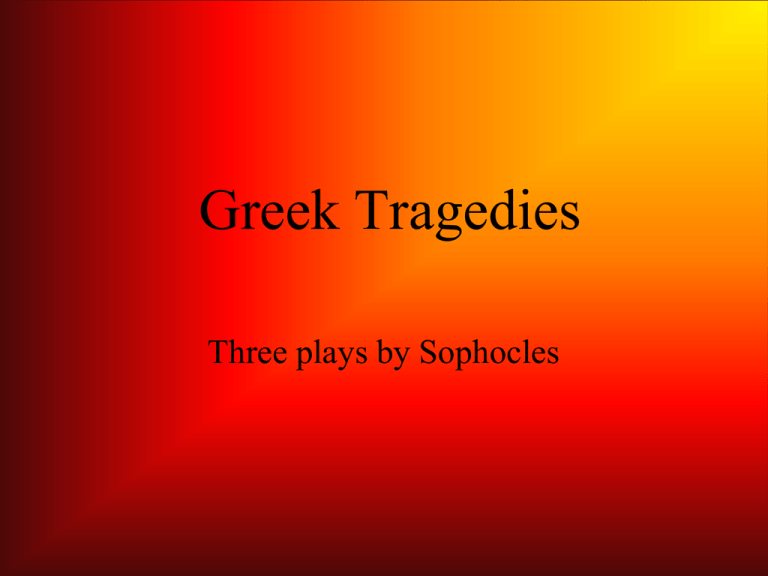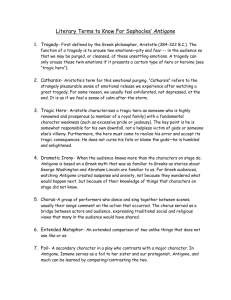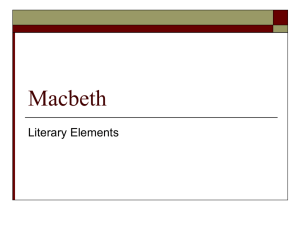tragic flaw
advertisement

Greek Tragedies Three plays by Sophocles Ancient Greek Drama • Plays were performed during the day in outdoor theaters built into hillsides. Festival of Dionysus* Each year, playwrights were chosen to produce three tragedies, along with a satyr play (a comic interlude) for a theatrical competition at the festival. *the god of wine and fertility Greek Tragedy A tragedy is a play about the downfall of a dignified, superior character who is involved in historically or socially significant events. Elements of Tragedy • Plot structure: – Reversal: situation develops in one direction and then changes quickly in another direction – Recognition (anangnorisis): change from ignorance to awareness – Suffering: A destructive or painful act – usually a public suffering • Catharsis: Feeling of relief and exaltation • Hubris: Hero’s Tragic Flaw Elements of a Greek Tragedy • The tragic hero must be a NOBLE MAN. He must be someone with whom the audience can identify. He is not perfect in virtue, but nobel in character. • The hero must possess a CHARACTER FLAW which helps to bring about is downfall. The character may make poor decisions because of this flaw. • The element of FATE plays a major role in the hero's downfall. His downfall may result from forces totally outside of the character's control. Ultimately, the tragic hero's downfall is brought about because of poor judgement and accidental happenings. • The hero's death must arouse PITY or FEAR in the READER as well as leaving the reader with more UNDERSTANDING ABOUT THE WAYS OF MAN. Tragic Heroes The tragic hero (or protagonist) is involved in conflict that builds from one event to the next until a catastrophe results. Fate and a tragic flaw also play key roles in the destruction of the hero’s life. Tragic Flaw A tragic flaw is a defect that brings about, or contributes to, the tragic hero’s downfall. The tragic flaw is often a positive trait that turns negative, such as pride, honesty, honor, confidence, or generosity. Ancient Greek Actors Men wore elegant robes with huge masks and elevated shoes to seem larger than life. Sophocles used three actors per play. They changed masks to change roles. The Chorus The chorus was a group of 15 men who spoke between scenes to comment on the action. They sometimes participated in the dialogue as well. The chorus was meant to represent the audience’s perspective and response. The Cycle Play # 1 = Oedipus Rex (Oedipus the King) Play # 2 = Oedipus at Colonus Play # 3 = Antigone (441 B.C.) Conflicts and Concepts The play Antigone deals with divided loyalties and difficult choices: faith, family, or kingdom? Greek Culture • “You can’t escape your fate.” • Non es actus reus nisi mens sit rea (there is no guilty act without a guilty mind) • Family is everything (thus, Oedipus has committed the WORST sins) • Curses bear power (Oedipus had to carry out his own curse.) • Truth matters (Oedipus had to solve the riddle of his own life by revealing a truth too awful to bear.) Antigone’s conflict deals with differences among the following principles: • Loyalty / obligations to family • Obedience to civil law • Observance of religious law • Protection of personal dignity • Freedom • Protection of community or nation Civil Disobedience: Rebellion with Purpose & Consequence Choosing to disobey the law as a matter of conscience, and accepting the concenquences. • Rosa Parks: refusing to relinquish her bus seat = arrested • Conscientious objectors: refusing to fight = jail • Henry David Thoreau: refusing to pay taxes so that his money won’t support programs he disagrees with = jail/fines Characters The tragic hero Antigone (daughter of Oedipus & Jocasta) Ismene (Antigone’s sensible sister) Creon (Jocasta’s brother, Antigone’s Uncle) Haemon (Creon’s son & Antigone’s fiancé) Euridice (Creon’s wife) Teiresias (a blind prophet) Chorus (commentary/summaries in poetry) Choragus (leader of the chorus) A Sentry A Messenger




